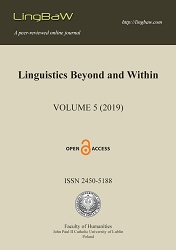Semantic transfers in the domain of FOODSTUFFS
Semantic transfers in the domain of FOODSTUFFS
Author(s): Aleksandra Zofia KowalczykSubject(s): Gender Studies, Lexis, Semantics, Sociolinguistics
Published by: Wydawnictwo KUL
Keywords: food metaphor; foodsemy; anthropomorphization; female names;
Summary/Abstract: In recent literature scholars have worked out a number of new categories of meaning development such as zoosemy, plantosemy and foodsemy. This paper focuses on the mechanism of foodsemy, a new category of metaphorical extension proposed by Kleparski (2008), and in particular on the cases of metaphorical extension that are targeted at human beings and their various qualities. Most frequently, the process discussed here involves the projection of attributive features and values, sometimes positive, yet most frequently negative ones, associated with members of the macrocategory FOODSTUFFS onto the macrocategory HUMAN BEING. The purpose here is to outline a limited number of metaphorical transfers involved in the conceptual macrocategory FOODSTUFFS targeted at such subcategories of the microcatergory FEMALE HUMAN BEING as ATTRACTIVE FEMALE HUMAN BEING, IMMORAL FEMALE HUMAN BEING and FEMALE BREASTS. For some language users it may sound somewhat unnatural, and hence unacceptable, to name a female person mutton with the intended metaphorical sense ‘a prostitute’, tomato applied in the transferred sense ‘attractive, but not a very wise female’ or peach, which denotes an ‘attractive female, especially in American English’. However, cases of foodsemy are nothing else, but instances of metaphorical conceptualizations, which are considered to be pervasive, unconscious and automatic. They are also universal, though different lexical items in different languages may acquire different metaphorical senses.
Journal: Linguistics Beyond and Within (LingBaW)
- Issue Year: 5/2019
- Issue No: 5
- Page Range: 90-102
- Page Count: 13
- Language: English

